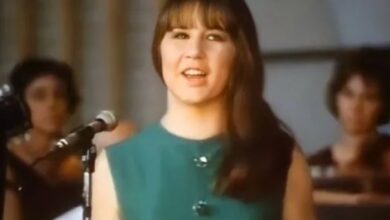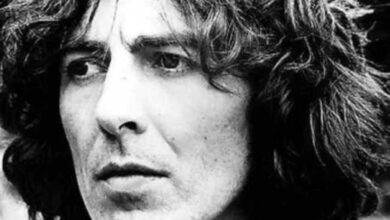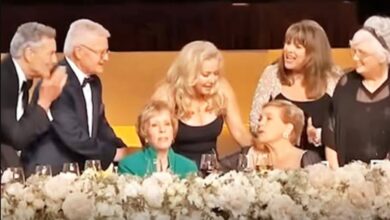Steven Tyler Headlines All-Star Tribute to Ozzy, His Voice Burning With Power
Steven Tyler’s role in the Ozzy Osbourne tribute medley was more than just another awards-show moment—it was living proof that rock icons still carry the fire to dominate a stage. Nearing 80, Tyler unleashed vocals filled with grit, emotion, and control that many performers half his age could only dream of. Though time has left its marks on him, his voice erupted with the same force that once defined Aerosmith’s peak, reminding fans why he remains one of history’s greatest frontmen.
What made the performance truly unforgettable wasn’t simply that Tyler could still reach the notes—it was the conviction behind every line. When he sang “Mama, I’m Coming Home,” the words carried the weight of decades in the industry, battles fought, and friendships earned. His rasp was not a flaw but a badge of survival, echoing experience rather than fragility. In that moment, Tyler shed the celebrity veneer and stood as a survivor honoring another legend who shared his road.
The history connecting Tyler and Ozzy stretches back to the golden age of rock. Rising in the late ’60s and ’70s, Aerosmith and Black Sabbath carved out different sounds, yet both shattered conventions and reshaped the genre. Over the years, the two men’s lives crossed at concerts, festivals, and countless stories of rock’s wilder years. That legacy hung over the tribute, making every lyric Tyler delivered resonate with shared history and brotherhood.
Sharing the stage with Joe Perry, Yungblud, and Nuno Bettencourt, Tyler embodied the bridge between generations. Younger talents brought their energy and skill, but Tyler carried the authenticity of someone who lived through the very revolutions that Ozzy helped ignite. His authority came not from nostalgia, but from having walked the same road as the man they were honoring—a peer offering respect with every note.
That authenticity made his age feel less like a number and more like a triumph. To see a man approaching 80 command a stage with such vocal ferocity was inspiring. His endurance came from more than luck—it came from sheer willpower, the same determination that kept him leading Aerosmith through decades of reinvention. In a culture obsessed with youth, Tyler’s presence proved that artistry can grow richer, deeper, and even more powerful with age.
The audience’s faces told the story. The cameras caught fans in awe as Tyler let his voice rip through the medley, proving that rock’s flame still burns hot. For many, seeing him deliver with such force felt like reassurance—the music of their youth wasn’t just a memory but a living, breathing force carried by legends who refuse to fade away.
Tyler and Ozzy’s journeys share common threads: fame, struggle, excess, near-misses with mortality, and resilient returns to the spotlight. That parallel gave the tribute a deeper emotional weight. Tyler wasn’t just singing a song; he was sharing scars, victories, and truths that mirrored Ozzy’s path. It was survival speaking to survival, wrapped in melody and grit.
When the chorus of “Mama, I’m Coming Home” soared, Tyler’s delivery felt like more than a performance. It rang with gratitude, farewell, and solidarity—one rock warrior saluting another. The crowd responded with tears and applause, not just for the song but for the sense of collective mourning and celebration that filled the arena. It was catharsis disguised as spectacle.
Joe Perry’s guitar provided a sharp edge, but it was Tyler’s voice that remained the heartbeat of the performance. He reminded the world of what defines a frontman—not just hitting notes but leading, connecting, and embodying the spirit of the music. Swagger intact, energy undimmed, Tyler moved with the same command that first made him a star, and the years only added weight to his presence.
Tyler’s nearly eight decades of life have been a saga of stardom, addiction, redemption, and resilience. Standing in the spotlight, all of that lived experience poured into his voice. It wasn’t flawless technique that made it moving; it was raw honesty. Cracks became character, imperfections became strength, and survival itself became part of the song’s truth.
The tribute also symbolized rock’s generational thread. With Yungblud representing youthful fire and Bettencourt showcasing virtuosity, Tyler anchored the stage with his veteran authority. It was a reminder that rock’s roots still matter, and that new artists build on foundations laid by those who first carved the path. Tyler’s role wasn’t to overshadow but to remind everyone where it all began.
Ozzy’s influence was at the center, yet Tyler’s voice gave the tribute a sense of legitimacy only a peer could bring. This wasn’t nostalgia wrapped in polish—it was alive, raw, and untamed, just like Ozzy himself had always been. Tyler knew the music, but more importantly, he knew the life behind it, and that gave the performance an edge that no rehearsal could manufacture.
As the medley reached its climax, the smiles of the younger musicians showed how much it meant to share the moment with a living legend. For them, standing beside Steven Tyler wasn’t just collaboration—it was a masterclass in what it truly means to embody rock and roll. Presence, spirit, and sincerity shone brighter than any pyrotechnics could.
When the lights dimmed and the final note hung in the air, fans turned to social media to pour out admiration. Many praised Tyler as sounding better than singers half, even a third of his age. Others simply called the performance proof that legends don’t fade—they evolve, growing stronger with time. The response showed that the performance resonated far beyond the arena.
Ultimately, Tyler’s salute was about more than honoring Ozzy—it was about reaffirming that rock transcends age, that friendship between icons carries its own power, and that the music they built still roars. Ozzy may have left the stage of life, but through voices like Tyler’s, his spirit endures. That night, Steven Tyler proved what every fan already knew: once a rockstar, always a rockstar.





